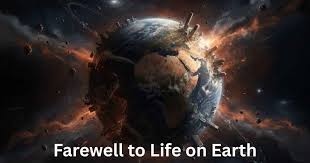In the grand story of existence, there comes a time when endings must be faced. The concept of farewell-to-life-on-earth is not merely about physical departure—it is a deep, emotional, and philosophical contemplation of what it means to leave behind everything we have ever known. When one utters the phrase farewell-to-life-on-earth, it evokes feelings of nostalgia, fear, gratitude, and hope all at once. It invites us to reflect on our journey as humans, our connection to this planet, and the legacy we leave behind.
Understanding the Meaning of Farewell-to-Life-on-Earth
At its core, farewell-to-life-on-earth signifies the final goodbye—the moment when existence transitions from the tangible to the unknown. It may be viewed as a personal reflection before death or as a collective farewell from humanity if we ever reach a point where Earth can no longer sustain us. This phrase reminds us that life is temporary, fragile, and beautiful. Every breath, every heartbeat, every sunrise is a gift that deserves appreciation.

In literature and art, farewell-to-life-on-earth has been symbolized in countless ways: the fading light at dusk, the withering of a flower, or the last flight of a bird before winter. Each metaphor captures the bittersweet truth that every beginning has an end. Yet within that end lies the seed of continuity—an echo that lives on in memory, nature, and spirit.
Humanity’s Legacy and the Planet We Leave Behind
When considering farewell-to-life-on-earth on a collective scale, it becomes a reflection of our civilization’s journey. Humans have achieved incredible feats—technological marvels, artistic masterpieces, and scientific discoveries that transformed our understanding of the universe. But alongside our progress, we’ve also witnessed the consequences of greed and neglect: deforestation, pollution, and climate change.
If one day humanity must say farewell-to-life-on-earth, it will not only be a physical departure but also a moral reckoning. What kind of legacy will we leave? Will the Earth remember us kindly as its caretakers, or as beings who took more than they gave?
In contemplating farewell-to-life-on-earth, we must acknowledge our responsibility toward the environment. The Earth is not merely a home; it is a living organism that sustains us. Our farewell should not be one of regret, but of respect and gratitude—for the rivers that quenched our thirst, the forests that gave us breath, and the stars that guided our way.
The Emotional Journey of Saying Goodbye
On a personal level, farewell-to-life-on-earth represents the intimate moment when an individual prepares to leave this world. It’s a time of reflection—looking back at joys, regrets, and the people who shaped our lives. In that quiet stillness, one realizes that the true essence of life lies not in possessions or achievements, but in love, connection, and kindness.
Those who have faced near-death experiences often describe the sensation of farewell-to-life-on-earth as peaceful rather than frightening. It is as if the boundaries between self and universe dissolve, revealing a greater harmony that transcends the physical world. This understanding gives comfort—it reminds us that even though we say farewell-to-life-on-earth, existence may continue in ways beyond our comprehension.
A Cosmic Perspective
When viewed through the lens of astronomy and science, farewell-to-life-on-earth takes on another dimension. Earth is but a small speck in an infinite cosmos. Our planet, while vibrant and rich with life, will not last forever. Stars die, galaxies collide, and planets change. One day, perhaps millions of years from now, Earth itself will cease to exist.
In that distant future, farewell-to-life-on-earth might not refer to humanity, but to the planet itself—a celestial body bidding goodbye as it fades into the cosmic night. Yet even then, the atoms that once formed our bodies and homes will scatter across the universe, becoming part of new stars, new worlds, and new beginnings. In this way, farewell-to-life-on-earth is not an ending, but a transformation—a continuation of existence in another form.
The Role of Faith and Philosophy
Different cultures and religions interpret farewell-to-life-on-earth through their own beliefs. Some see it as the soul’s journey to an afterlife, while others view it as reincarnation or return to the source of all creation. Philosophers, too, have pondered the meaning of existence and the inevitability of its end.
To some, farewell-to-life-on-earth is a call to live meaningfully—to cherish every day as if it were the last. To others, it is a reminder of humility, showing that no matter how powerful or wealthy one becomes, all must face the same farewell. This universal truth connects humanity, bridging divides of culture, class, and creed.
Lessons from Farewell-to-Life-on-Earth
What can we learn from embracing farewell-to-life-on-earth as a concept? Perhaps the most profound lesson is acceptance. Life is fleeting, and in accepting its impermanence, we find freedom. When we stop clinging to the illusion of control, we begin to truly live.
Saying farewell-to-life-on-earth does not have to be sorrowful—it can be a celebration of existence. Every moment lived with purpose becomes a farewell gift to the world. Whether through acts of kindness, creative expression, or environmental stewardship, each of us can leave behind a legacy that outlives our physical presence.
The Final Reflection
In the end, farewell-to-life-on-earth is not just a phrase; it is a mirror reflecting the essence of being human. It is both a reminder and an invitation—to live fully, love deeply, and leave gently. As we journey through the fleeting beauty of life, we should strive to make our farewell-to-life-on-earth a graceful one, filled with gratitude for the wonders we’ve witnessed and the hearts we’ve touched.
When the final moment arrives, and we whisper our farewell-to-life-on-earth, may it not be a cry of loss, but a hymn of completion—a peaceful acknowledgment that we were part of something vast and beautiful. And though we may leave this world, the essence of who we are—the love we gave, the kindness we shared, and the dreams we pursued—will continue to ripple across eternity.




